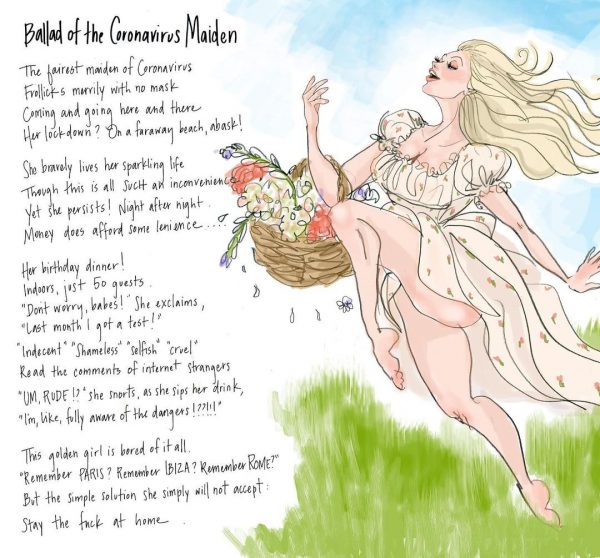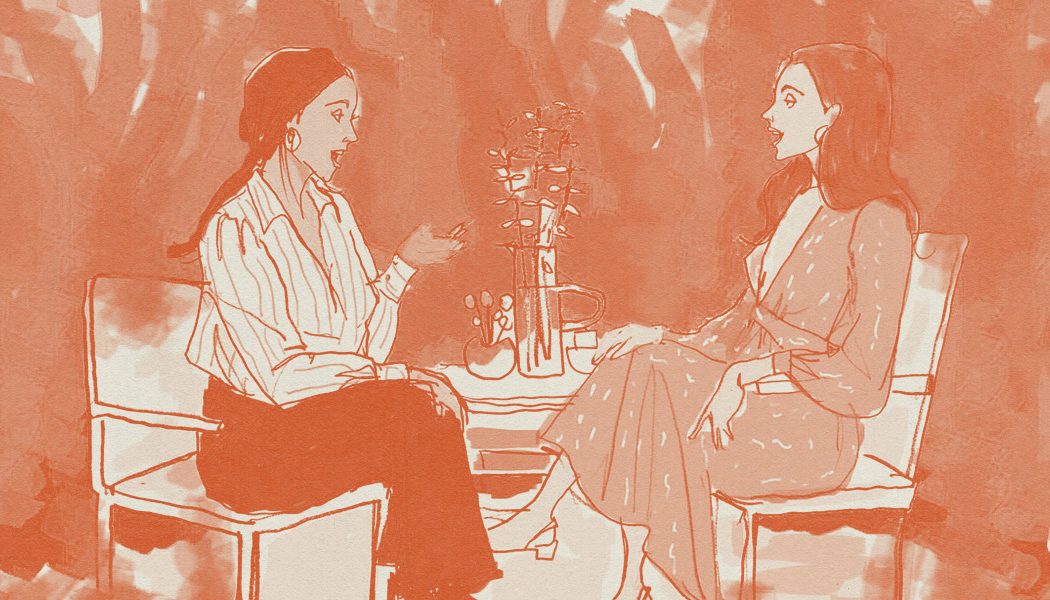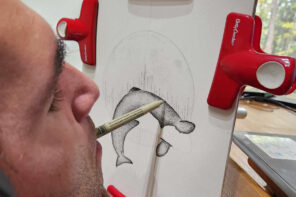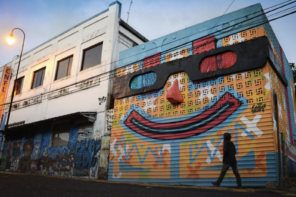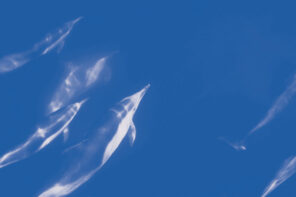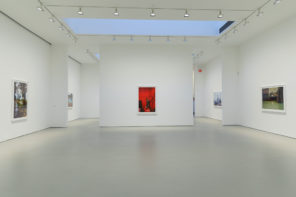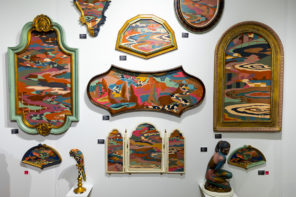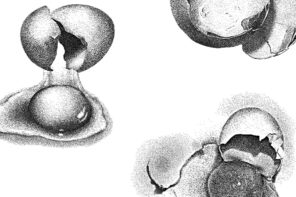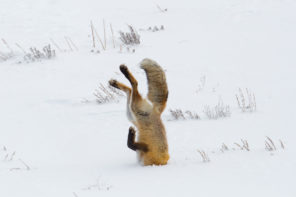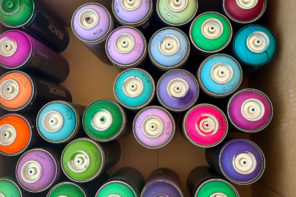Wine Writer Vanessa Price interviews Illustrator Julie Houts
@vanessalenoreprice x @jooleeloren
Vanessa Price’s recent book Big Macs & Burgundy: Wine Pairings for the Real World takes some of the mystery out of wine and adds a healthy dose of irreverence, representing said wine pairings with illustrations. Those illustrations might not have been by Julie Houts, but Vanessa had long admired Julie’s work and her Instagram @jooleeloren, since way before Julie’s book Literally Me, a collection of darkly comic illustrated essays, came out a couple of years ago.
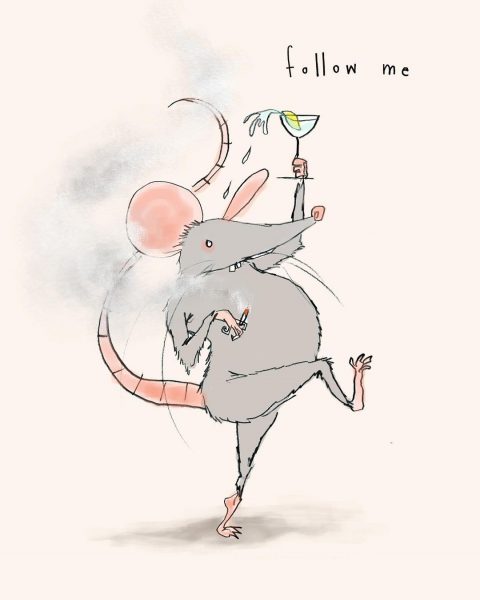
Vanessa Price: I understand your background is design. How did you decide that illustration is what you wanted to do?
Julie Houts: I went to art school initially in Chicago and studied painting at first, which… I’m a terrible painter. So very quickly realized that and transferred into the fashion design program there and then eventually transferred to Parsons, finished a fashion degree at Parsons and then started working in the fashion industry. I was a designer for women’s wear, mostly dresses and tops for seven or eight years, working at J.Crew for most of my career, really. And I’ve always loved illustrating. It was always my favorite part of designing, the drawing part. I just never thought that you could actually be an illustrator. I always thought, “Well, that’d be a great job, but that’s not a real job.” So, it was something I did for fun and on the side and I didn’t take it too seriously, but I started making these drawings that were a little bit satirical and I would just post them on Instagram, just for my friends.
This is years and years ago when Instagram first was starting up and I had like five followers and I knew all of them. But over time, I think as the platform grew, I just started to gain, slowly, a bit more and more of a following. And then I started being offered just little illustration jobs here and there that I was just thrilled about because I was still working at J.Crew and it just kept growing and it got to a point where then I got offered a book deal and I was getting a lot of client work and all of a sudden I was just like, “Now or never. I might as well try.” So that was, I don’t know, maybe four or five years ago now. So I’ve been doing it ever since.
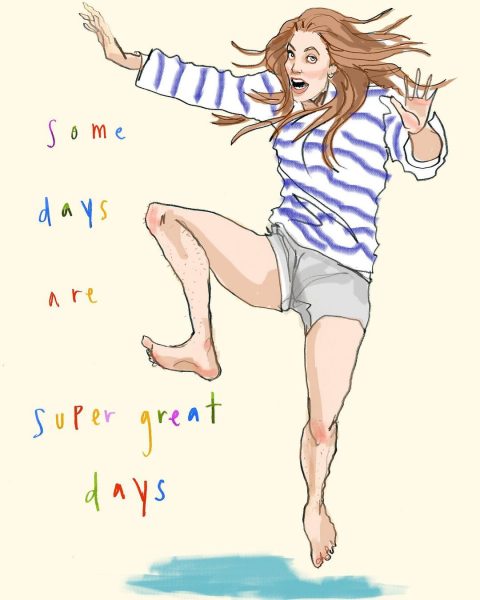
Vanessa: How do you think you found your voice? It’s a very specific voice.
Julie: I’m sort of…a little biting, but satire is just how I process information, really. So I think for me it was just natural to point and try to pick things apart.
Vanessa: One of your most recent posts I actually personally loved because I’m originally from Kentucky—but you had three different Halloween costume ideas: One of them was a sexy Mitch McConnell with the purple hands and the purple face. And then you had the election 6 p.m. and 2 a.m., if you wanted to go as a couple thing—and obviously, one is very cute and put together and the other one is basically dying inside and outside. The third one is a pretty girl, cliché pretty, who is apolitical, and loving fall is a core tenant of her personality or something like that.
I often enjoy reading the comments because there’s a lot of judgment in the comments, not of your art per se, but of the characters. And I noticed that for this particular set, everyone focused on number three, on her. And there was so much judgment around who she is and what she does. For me, as the voyeur looking at it, I think, “Well, the people making these comments have missed the point because they’re probably in fact sometimes these people.”
Julie: Yeah, absolutely. I always find this fascinating, too. I’m always in the comments, initially to make sure I’m not getting some criticism or feedback that I didn’t anticipate. So I monitor at least for the first bit. But yeah, I’m always surprised when I think I’m just so overtly pointing at something, picking it apart. There’s always a huge contingent of people that—I don’t know if it goes over their head or what it is, but they will just very wholeheartedly be like, “This is me.” Maybe they’re just very self-accepting and they’re owning it. I’m not sure.
Vanessa: Have you ever had one that you were like, “Whoa,” in a negative way, the feedback that you weren’t expecting it to go that way?
Julie: I think that sometimes I’m grateful for the comments because I had my understanding of what it is and my intention for what it is, but sometimes I just have blind spots. It hasn’t happened very often because I do try to be very careful. I don’t want to hurt anyone. But there have been a few times where I’ve just had some blind spots and thankfully people in the comments have called them out and I have to look at it and think about it. I don’t always think it’s valid, but I definitely have in the past thought, “Oh, they’re right. That’s not what I wanted to do with this.”
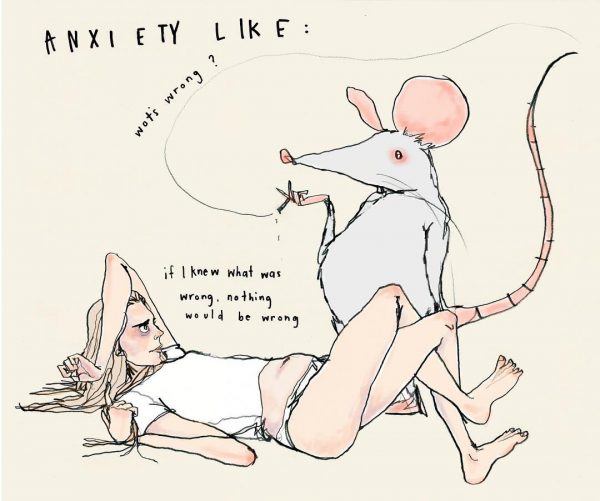
Vanessa: Interesting. Would you give us an example of one?
Julie: Way, way back, coming from a fashion design background, they teach you to draw figures in such a specific way and they’re very skinny, very tall. They’re just models, basically. And so for me, it was just autopilot that when I was going to sit down and draw a body, that’s the body that would come out, basically, of my hands. And I really did not think about it very much. And I think the more I was posting and the bigger of an audience I got, people started calling it out. “What is this about? Why are you only drawing these very thin women?” And it was something I truly had not thought about. And once I thought about it more, I was like, “Yeah, that’s fucked up. I need to address that.”
Vanessa: I’m pretty sure every woman on the planet, and probably the guys following, too, can identify with the belly that a lot of your characters have and it’s fun to often see the belly. The name of your book is Literally Me and I’m sure that there’s a lot of people that go, “That’s literally me.”
Throughout your illustrations, you have a lot of mice. What do they represent to you? Are they your subconscious? Are they literally the furry creatures that you had throughout your New York City apartment years? What are they?
Julie: I need to just come up with an answer to this, because everyone wants to know. I don’t totally know. They’re more or less just a little sidekick, but it’s useful. Sometimes they’re a useful device. They can point at things or say things that I actually wouldn’t want to have come out of my mouth or a person’s mouth. They’re kind of impartial. It’s easier sometimes to have things come out of animal mouths. So sometimes I use them that way, but I don’t really know where they come from. I definitely have had tons of mice in my apartments here. So maybe that’s why.
I just have to make friends with these mice because there’s no fighting them.
Vanessa: Did you ever befriend one or were you always trying to get them out?
Julie: There was one apartment I had that just was infested and it was disgusting. At some point, I think I was just like, “You know what, I can’t. I just have to make friends with these mice because there’s no fighting them, basically.” So I do remember going to sleep and hearing scurrying and just being like, “I guess we’re friends now. I guess we all live here together. These are my roommates.”
Vanessa: I’ve gathered from what I’ve learned through your social that you are also from a small town in middle America.
Julie: Yeah. I grew up in Fort Wayne, Indiana. I grew up there, but we moved when I was 16 to St. Louis, Missouri, but all my family’s Midwestern farmers.
Vanessa: And do they appreciate what you do? Are they ever like, “Can you explain it to us?” Or do they get it?
Julie: They’re all so nice about it. I don’t know if they totally understand it. And I think sometimes, at least for my mom, it’s like, “This is a bit much. You need to tone down the language here.” They’re like, “I can’t believe this is what you do with your life and time.” I’m like, “Yeah, me neither.”
Vanessa: I remember when I told my parents I was moving to New York and I was going to be a sommelier. They were like, “I don’t even know what that word is.” And then I was like, “It means I’m going to work in wine.” And they were like, “What does that mean?”
Julie: Right. How does one work in wine?
Vanessa: How would one work in wine? This thing that we drink, how does someone have a job in that?
Julie: It’s got to be the most glamorous sounding job to your parents.
Vanessa: I imagine it’s probably not too dissimilar from fashion in that it certainly has 10% glamorous side and then a 90% drudgery, work, all of the behind the scenes stuff. Certainly you’re never lambasted for having a glass of wine in hand while you’re trying to survive the work. It’s a nice plus.
Wine is something that you can view as a necessity, or you could view as a luxury, depending not just on the price point, but on your perspective. For some people in their culture, it literally is a way of life. It’s just as integral as food maybe or showering. Wine is a part of culture. And for other people, it’s a way of finding ways of connecting.
But it is also hard to balance that against what is the right chord to strike in what is such a fantastically complicated year between the election process, the Black Lives Matter movement really hitting a crescendo—which was awesome—obviously the global pandemic that we’re dealing with. So how do you feel like your voice could contribute if you’re feeling more inspired? Or do you think that your page is more a place for people to visit to have a reprieve from the heaviness? How do you view what your role could be?
julie: I think it’s both. It’s tricky. I think I definitely felt over the summer amidst the protests and everything, I just felt, I have this platform. The makeup of it I understand is largely white women. And I just felt some sense of it’s so irresponsible for me to not talk about this and share resources and that’s also all I was thinking of. So it’s tricky because I definitely feel a sense of social responsibility that if I do have this larger following, I need to use it basically for good on some level. But I also don’t feel like sometimes, as an artist, it’s good for me to tie up my work so closely with whatever’s going on.
I do want it also to be a space where I can just talk about stupid shit if I want to. So it’s hard to find that balance and I go back and forth with it basically. But I think ultimately, the space is a reflection of where I’m at. So there hopefully would be room for all of that, like criticism, frivolity, some sense of social responsibility. Hopefully, ideally, there’s room for everything.
